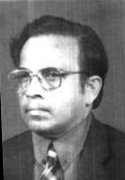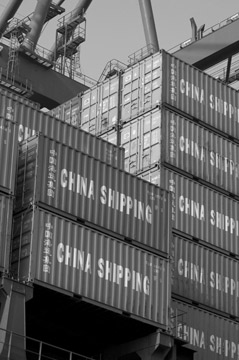|
Economic development in post-war Sri Lanka:
Challenging but rewarding task
 |
|
Sam Samarasinhe,
Director,
Techno Management Consultants |
How a country that has won the most difficult of battles - the battle
against terrorism - would approach its next obstacle - economic
development - in the wake of a global economic crisis is under the
scrutiny of many economic experts. However, developing an economy that
has been nearly crippled by a three-decade-old war is easier said than
done. Many economists have presented proposals that are too unrealistic
for our country.
Sam Samarasinhe, Director, Techno Management Consultants (Pvt) Ltd,
shared with us the approach he would adopt for economic development in
post-war Sri Lanka, with his many years of experience working in many
countries. An engineer by profession, Samarasinhe played a major role in
the economic development of Singapore in the 70s. He is also a member of
MENSA.
"In the 70s, Sri Lanka was more developed than Malaysia and
Singapore", explained Samarasinhe. But in a matter of decades this has
changed." Sri Lanka has overcome the biggest hindrance to economic
development - terrorism. But the development of the Sri Lankan economy
will be challenging", said Samarasinhe. "The President has started
developing ports, airports and the transport sector under his own
initiative and foreign funding", but much more needs to be done in other
sectors, he said.
He explained that this is due to the inefficiency of most Government
ministries and departments. "Most senior officials of ministries and
departments are inefficient and completely uninterested in the
development of the country", said Samarasinhe. He explained that facts
are often swept under the carpet by some corrupt individuals.
Samarasinhe explained that to develop Sri Lanka's economy, 12 sectors
have to receive attention simultaneously. Any lapse in maintaining a
parallel would result in irreversible repercussions.
Education
Ninety percent literacy rate would be of no meaning if tertiary
education is available to only three percent of school-leavers, as is
the case now. "This should be increased to at least 20 percent in the
short term and 30 percent in the long term", explained Samarasinhe.
In the 60s and 70s Sri Lanka was a country famous for producing
intellectuals for the world. But today Sri Lanka has come to be
well-known for producing housemaids and labourers. The only way to
remedy this, as Samarasinhe explained, is to establish private
universities.
Although this may seem like an unwise decision, it would bring
guaranteed beneficial results in the long run. And although it may seem
that students who are incapable of affording high profile private
universities are at a disadvantage, in the long run government
universities would be forced to raise their standards to be able to
compete with private universities. "This is exactly what happened in
Singapore and Malaysia" explained, Samarasinhe.
According to him a country such as Sri Lanka would require at least
50 such universities fulfil the needs of the job market Samarasinhe
emphasised that 10 to 20 percent of the allocations of these
universities should be reserved for poor children.
"A housemaid can be turned into a doctor with as little as Rs.
600,000, he said. "Rather than sending uneducated and undereducated
individuals, abroad it would bring in huge amounts of foreign revenue to
send abroad well-trained and educated individuals."
Research and development
Sri Lanka's allocation for research and development is 0.14 percent (Rs.
56 million) of the gross domestic product. "This is just enough to pay
the salaries and cover the day-to-day expenses of personnel involved in
the field of research and development", said Samarasinhe. Singapore has
allocated US $ 2.6 million from its gross domestic product for research
and development.
 |
|
Import of manufactured goods |
"If we are to be called a developed country this should be increased
to 0.5 percent immediately and 1 percent within three to four years." In
fact, Samarasinhe pointed out that low funding in this particular field
is a major reason for the brain drain and collapse of industry's in Sri
Lanka.
Export of manufactured goods
High-tech exports are a key indicator of the development of a
country.
More than 60 percent of manufactured goods exported in Singapore and
Malaysia are high-tech. Only 3 percent of all manufactured goods
exported from Sri Lanka is high-tech. Samarasinhe recommended that this
should be immediately increased to 20 percent in the short term and 50
percent in the long term.
"Sri Lanka can easily manufacture high-tech goods like mobile phones.
But we choose to spend millions annually on importing such goods", said
Samarasinhe.
However, this is easier said than done. In a country where the
consumer is used to high-quality imports, will they be willing to settle
for anything less? Samarasinhe says that it would not be easy. When the
manufacturing standards are raised and the local market is secured,
Samarasinhe said that the world market is not too far off.
"We must learn to value Sri Lankan goods, even if they are of
somewhat low quality at first. The quality would have to be raised
according to increasing demands. This is exactly what happened in
India", said Samarasinhe. The Singapore government owns over 65 percent
of the economy, revealed Samarasinhe. Only 35 percent is owned by the
private sector.
Health
One person in every family in Sri Lanka is sick. This was not so 40
years ago. The main reason for this, as pointed out by Samarasinhe, is
the soaring price of drugs. A viable solution to this problem would be
to convert 20 percent of government hospital beds into paying wards.
"But the rate should be half of that of private hospitals", he said. And
also, the profits should be made available to poor people.
Samarasinhe also emphasised the significance of conducting studies in
alternative medicine for common illnesses such as high blood pressure,
diabetes and cancer. "There are many herbs, spices and fruits generally
available in Sri Lanka that have amazing healing properties.
The Department of Ayurveda should explore every possibility to
develop alternate local cures for at least these common illnesses," he
said.
Transport
This is a sector in which Sri Lankan development has shown very low
productivity. To increase its productivity the number of vehicles
entering the city should be restricted as well as the number of
passengers in private vehicles such as cars increased. Three-wheelers
should contain at least three passengers.
Samarasinhe explained that Sri Lanka could, due to its location be a
major oil refining country. "There are many other advantages to
developing oil refineries in Sri Lanka. We can save on imports and can
become a leading exporter of petro-chemicals, some of the most expensive
products that come from oil refining."
Planning implementation
"Every developed country has achieved its development according to a
set of development plans", explained Samarasinhe. "For every ministry
there is a development plan spanning five to 10 years. In Sri Lanka most
development is ad hoc."
He stressed the need to plan and develop Sri Lanka according to a
proper long-term plan.
Security
To keep such threats to national security such as the LTTE at bay,
Sri Lanka should have development committees at every Grama Sevaka
division, suggested Samarasinhe. "These committees should produce
development plans for local authorities. Voluntary work in the committee
by various development officials in the area should be made compulsory."
Small and medium industry
Seventy percent of Sri Lanka's workforce in the industry comprises
small and medium industry labour. "The development of any country
depends on its government's support for small and medium industry",
explained Samarasinhe. This could be in the form of finance, business
development, research and development and marketing. Samarasinhe warned
that if the situation is not immediately dealt with the whole industry
could collapse in a matter of years.
Agriculture
With no seasonal changes and plenty of sun and rain, Sri Lanka is one
of the best places for agriculture. But according to Samarasinhe the
agricultural methods we have adopted are rather backward and
inefficient. "We have many experts, but no support or authority", said
Samarasinhe. "Sri Lanka has 1.8 million acres of cultivable bare land."
The Department of Agriculture should develop a master plan for all
land, recommending suitable crops for every piece of land, while also
providing technical, financial and marketing assistance. He also
recommended that inter-cropping be made mandatory especially for coconut
and rubber estates due to the limited land.
Alternative energy
Substitutes for petrol, kerosene and gas could easily be manufactured
with the technical know-how available in Sri Lanka. Raw material
required for alternative energy development, such as sugarcane, manioc,
sweet sorghum and castor, is easily cultivable.
Samarasinhe explained that other alternative energy sources such as
biogas, solar and wind power would be expensive in the initial stages,
but once the infrastructure is in place power generation expenses are
minimal. "We could use the money we spend on crude oil to obtain
technology; besides technology is getting cheaper by the day."
Construction
Samarasinhe recommended that every divisional secretariat contain a
housing scheme, for which the plan should spread over ten years. "This
would provide job opportunities for skilled workers in the area."
Foreign investment
The current form of foreign investment - where only labour is paid
for and no technology transfer takes place - is hardly beneficial. "In
countries like Malaysia, Singapore and Thailand most investors
subcontract their work to local industrialists, facilitating technology
transfer,"he said.
Embassies
Samarasinhe emphasised the importance of embassies as links between
development in foreign countries and Sri Lanka. This is currently not
visible, he said.
Contribution by the educated and intellectuals to development
Within the last 30 to 40 years, thousands of individuals have left
the country, because they felt that their suggestions for Sri Lanka's
development were neglected. To prevent this situation from continuing,
Samarasinhe suggested that a committee consisting of a group of educated
intellectuals be appointed to consider and monitor its implementation.
Sri Lankans abroad
More than two million - 90 percent of Sri Lanka's intellectuals - are
domiciled in various foreign countries. "We have never attempted to tap
this resource for the development of the country. This should be done
through embassies," Samarasinhe said.
Customs
Import of manufactured goods is a major problem for industrialists in
Sri Lanka. "While some industrialists pay taxes and levies for raw
material some racketeers get away without paying a cent," said
Samarasinhe.
 |
|
Wind power would be expensive in the
initial stages, but once the infrastructure is in place
power generation expenses are minimal. |
He said that not only should this be stopped immediately, but also
heavy taxes imposed on the import of manufactured goods.
Holidays and productivity
Sri Lanka has a large number of holidays. As a first step towards
development, Samarasinhe suggested that this should be cut down by 70
percent and a program introduced to increase the productivity of Sri
Lankan workers especially in the public sector.
Quoting Minister Champika Ranawaka, Samarasinhe said that only a
handful of intellectuals in Sri Lanka are capable of providing knowledge
and advice towards the country's well-being. And even fewer can actively
implement such plans with dedication. Only a few officials who had been
appointed as decision makers are educated, intelligent, honest and
capable of fulfilling their tasks.
Most senior appointees are between 50 and 55 and have economic,
health, mental and other social problems, said Samarasinhe. "At a time
when they are struggling to solve their own problems, matters of
national development would be of little interest to them."
Samarasinhe explained that countries such as Thailand, Malaysia and
Singapore solved this problem by appointing honest and efficient
individuals as young as 30 years of age to high positions in ministries,
government departments and other organisations. The same could be
applied to Sri Lanka, he said.
Samarasinhe said that it is the duty of all intellectuals in Sri
Lanka to provide the Government with accurate facts on Sri Lanka's
development. "If this happens the President would be able to develop the
country in as little as five years."
- SP
|

